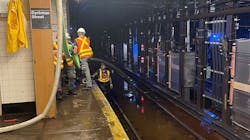Extreme weather is impacting transit agencies in New York City, as well as in central Texas and Oklahoma. While media reports focus on the record heat affecting Europe, most of Oklahoma, central and eastern Texas, most of Arkansas, northern Louisiana and the western counties of Tennessee and Mississippi were under excessive Heat Warning from the National Weather Service.
The National Weather Service Prediction Center said “scorching heat” would remain a concern over the next few days due to “a stagnant upper-level ridge” hovering over the Southwest.
In Oklahoma City, Okla., EMBARK published a list of cooling centers throughout the city, as well as which bus routes could be used to access them. The list also included cooling centers in Midwest City and Norman, Okla.
Dallas Area Rapid Transit (DART) will operate light-rail vehicles no more than 30 mph between 2:00 p.m. and 9:00 p.m. through Wednesday, July 20, due to the record high temperatures expected to impact north Texas. DART warns the speed restrictions could result in delays of 10-15 minutes.
Steel rails can be at greater risk of experiencing a thermal buckle under extreme heat conditions where reduced travel speeds can mitigate the risk. Rail systems with overhead wires can also experience sagging wires in extreme heat. Last summer, Portland Streetcar shared an image of damaged power cables caused by extreme heat.
And then there’s the rain
While southern parts of the U.S. might view rain as a form of relief from the heat, in New York City, heavy rainfall Monday afternoon brought downed trees, flash flooding and high water to Metropolitan Transportation Authority’s (MTA) network.
MTA says hundreds of frontline workers worked throughout Monday night and into Tuesday morning to clear the debris and water from tracks to ensure a smooth commute Tuesday morning.
“Flash flood events are a relatively new hurdle, and NYC Transit responded by pumping thousands of gallons of water from the system,” said NYC Transit President Richard Davey. “I want to thank the whole subways team for acting quickly; extreme weather events are never easy, but they kept service disruptions to a minimum with their efforts.”
Metro-North Railroad President and LIRR Interim President Catherine Rinaldi noted the storms disruptive impact to commuter rail service during Monday’s rush period, but praised Metro-North employees who stepped up “as they always do.”
“It is thanks to their diligent response that we were able to restore service in a timely fashion and be set up for a normal morning commute. Many thanks to our customers for their patience as we responded to yesterday’s challenging conditions,” said Rinaldi.
MTA says A Line service was suspended due to flooding conditions, while a downed tree north of the Gun Hill Road station impacted service on the 5 Line. MTA says crews in the Concourse Yard, which affects B and D service, acted quickly to preserve switches after seeing water enter the yard.
High water conditions in the Bronx and Westchester County impacted Metro-North service into Grand Central. On the Upper Harlem Line, MTA says crews worked to remove a downed tree across the tracks near Croton Falls that suspended service between Goldens Bridge and Southeast in the early afternoon. A downed tree also caused a temporary suspension of service on the New Canaan Branch.
Normal service was fully restored in time for the morning commute, although trains on the 1 subway line bypassed 181 Street Station in Washington Heights Tuesday morning due to an elevator outage caused by flash flooding from the torrential rain.
About the Author

Mischa Wanek-Libman
Group Editorial Director
Mischa Wanek-Libman is director of communications with Transdev North America. She has more than 20 years of experience working in the transportation industry covering construction projects, engineering challenges, transit and rail operations and best practices.
Wanek-Libman has held top editorial positions at freight rail and public transportation business-to-business publications including as editor-in-chief and editorial director of Mass Transit from 2018-2024. She has been recognized for editorial excellence through her individual work, as well as for collaborative content.
She is an active member of the American Public Transportation Association's Marketing and Communications Committee and served 14 years as a Board Observer on the National Railroad Construction and Maintenance Association (NRC) Board of Directors.
She is a graduate of Drake University in Des Moines, Iowa, where she earned a Bachelor of Arts degree in Journalism and Mass Communication.
